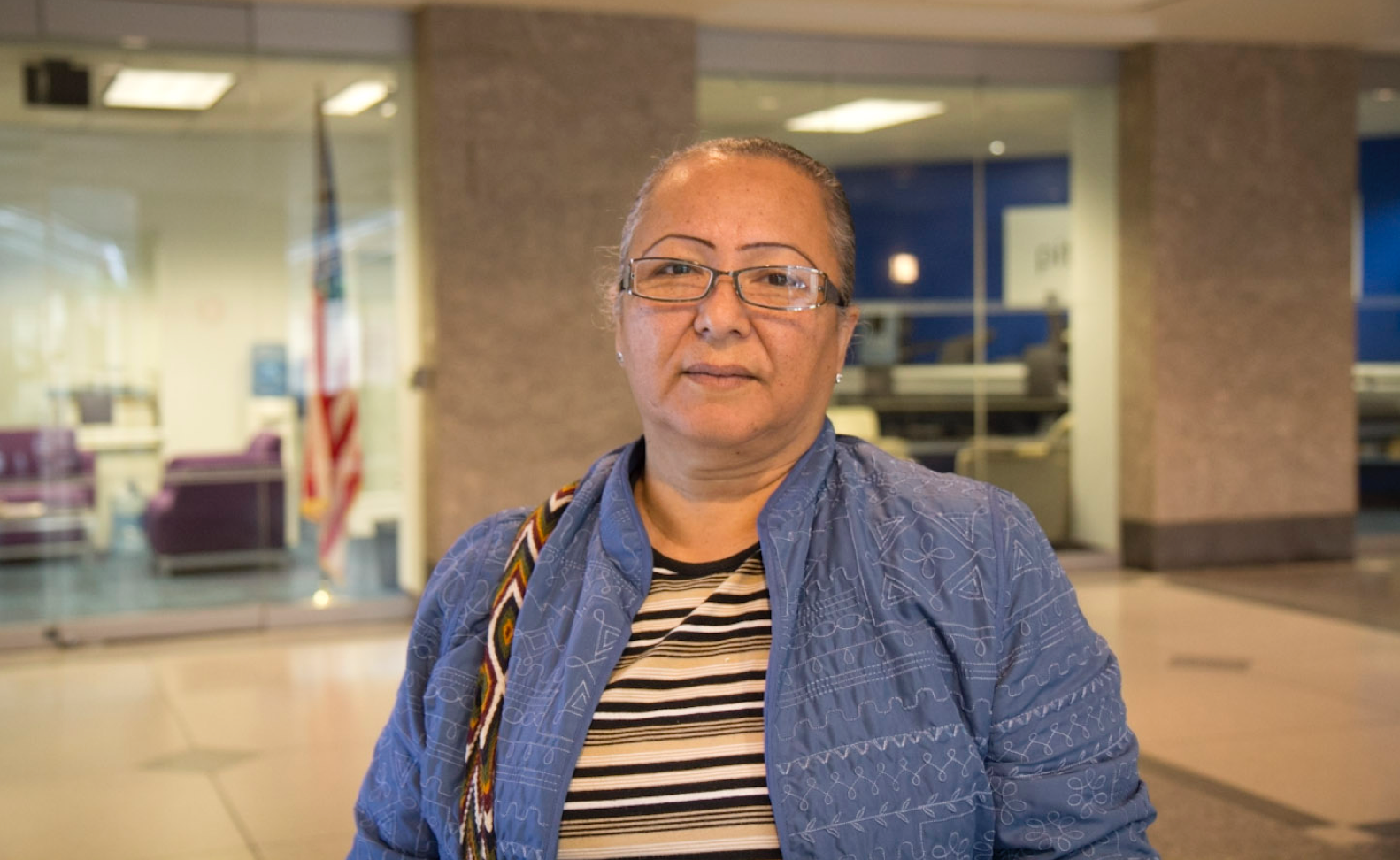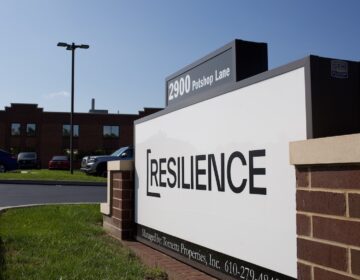Clinics help some immigrants navigate path to citizenship
Listen
Maria Serna carries a tote bag with all her legal files with her. (Kimberly Paynter/WHYY)
On a recent Wednesday morning, the lobby of a Center City law firm buzzed with activity.
Roughly three dozen attorneys were gathered beneath its soaring glass atrium, but a queue of green-card holders were also there to start the process of becoming U.S. citizens.
Roxanne Reid came to the U.S. from Jamaica when she was in middle school. Sixteen years later, she said she wants to become a citizen so she can bring her ill mother over for medical care.
Reid, one of a couple dozen people to sign up for a citizenship clinic in Philadelphia, was also concerned about the current political climate and what it might mean for people like her in the future.
“I’m just trying to make sure I’m OK. I don’t want nobody to try and deport me,” said Reid.
The Trump administration’s continued efforts to crack down on the country’s unauthorized immigrants frequently came up as other clinic participants explained their reasons for signing up now. But their motivations run deeper.
For Maria Serna, it’s about capping off a two-decade long struggle to have a voice in America.
“I want the same rights that everybody has. You know, you’re a citizen, you have the right to vote, you have the right for go and travel, you can run for office,” said Serna.
Serna came from Colombia in the late 1990s with her husband and two kids. More than a dozen family members were already living here by then.
It wasn’t an easy decision.
In Colombia, Serna had a career drafting buildings for an architecture firm. She had her own office.
In the U.S., she knew her limited English would likely make it harder to have the same lifestyle, if it were possible at all. But with her husband out of a job and no real prospects, Serna knew what she had to do.
Nos vamos, she told her family. Let’s go.
“We decide to move for a better life,” said Serna.
Tough situation, tougher choices
The family came over on travel visas with intentions of applying for something permanent.
Serna was crushed when she heard she didn’t qualify. She grew up in a household where doing the right thing was a family mantra. Now, to stay in the U.S., she would be breaking the law.
“I cry a lot,” said Serna. “But at the final, I say, “OK, I here. I keep going.'”
Serna spent 15 years living illegally. She couldn’t get a job at any architectural firms, so she cleaned houses like her husband.
She learned to live with that, but Serna still gets upset when she thinks about the years she was here without an ID or papers to prove who she was.
Now 56, she’s finally in line to become a U.S. citizen, thanks to a never-ending supply of determination.
After doing her own research, Serna came across a provision of the “LIFE Act” that gave her the ability to apply for a green card.
Passed by Congress in 200, the Legal Immigration Family Equity Act is aimed at giving citizens and green-card holders the chance to reunite with family members who previously were unable to obtain legal status.
Serna had to prove that her mother filed a petition to get her daughter a green card shortly after Serna arrived in the U.S, even though she didn’t qualify because she was married.
With the help of an immigration lawyer, she tracked down that lost document.
It was a big victory — years in the making.
“I lose too many opportunities to have a better life and do another thing — do the same thing that U.S. citizens do. That’s like you live as second-class citizens,” said Serna.
Serna said she’ll be happen when she officially becomes a U.S. citizen, but not necessarily bowled over. She’ll still be the same person on the inside, she said.
A long and winding road
For others, that day will be quite emotional.
While she was never unauthorized, Tapiwa’s dizzying trek to the U.S. spanned three continents. She expects tears to flow at her ceremony, whenever it happens.
“I never thought the journey would be this long from, ‘Hey I’m going to Australia and, wow, I now live in the U.S.’ How did this happen?” said Tapiwa.
NewsWorks is withholding the 34-year-old’s last name because she fears going public with her story until she’s officially a citizen.
Tapiwa grew up in Zimbabwe. But when it was time to college, she knew she wanted to leave. She picked Australia to study communications.
While she was there, her family moved to the U.S.
“Because of the political situation and the financial situation that was going on in Zimbabwe, we were able to work with some of the lawyers to be able to get asylum. I was a derivative asylee at that point because I was under 21,” said Tapiwa.
Zimbabwe was in a tailspin even before Tapiwa left. There was political violence and economic turmoil, especially in the rural areas of the country.
“We started standing in lines to get the basics at this point. And just going from point A to point B, we were starting to run out of gas,” she said. “People would be in fuel lines for days.”
Tapiwa’s journey to the U.S wasn’t exactly intentional. It’s more the product of a pair of mishaps and a longing for family.
Before arriving in America, the paperwork supporting Tapiwa’s asylum status was mysteriously lost. That meant she couldn’t travel to the U.S. until it was recreated.
“It’s almost like saying, ‘I have a green card, but I can’t actually show you I have a green card,'” she said.
Nearly three years passed before it was fixed. By then, Tapiwa was working in South Africa … where a woman later stole the money she submitted to renew her work permit.
But the timing was perfect, at least far as Tapiwa was concerned. She was ready to join her mother in the Philadelphia suburbs. She hadn’t seen her in five years.
“It really started taking its toll on me. Very much so emotionally and mentally. I just got to the point where everything felt incredibly difficult to maneuver because I was on my own,” said Tapiwa.
Tapiwa said she never planned to live in the U.S. These days though, she said she’s glad to be here. Glad she finally has the opportunity to feel like she belongs.
WHYY is your source for fact-based, in-depth journalism and information. As a nonprofit organization, we rely on financial support from readers like you. Please give today.





